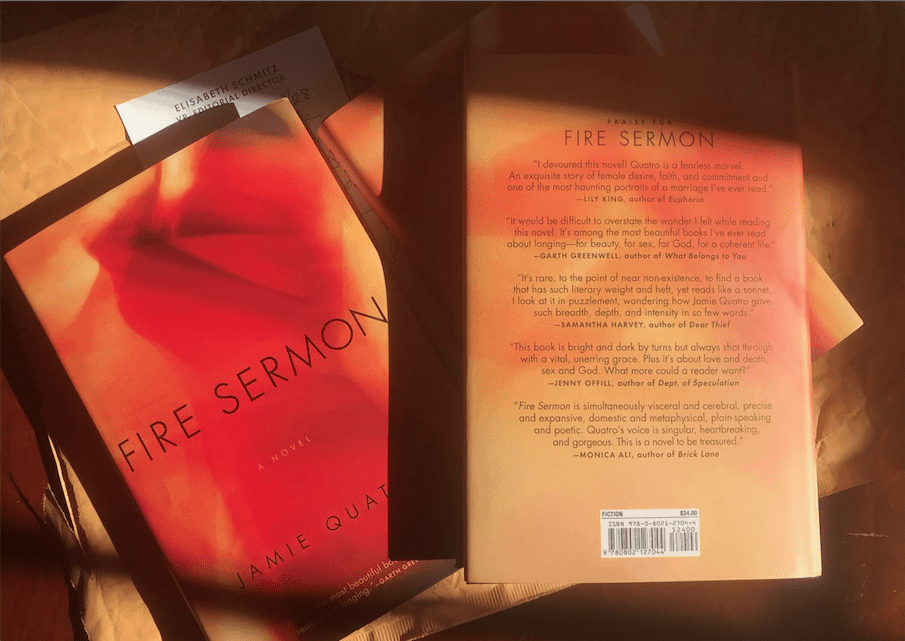
BY ALEC HARVEY
First-time novelist Jamie Quatro comes to Square Books Jan. 23 to sign “Fire Sermon,” but it’s not the book she thought she’d be signing here. “Fire Sermon” came to her while writing “Two-Step Devil,” which, you’ll read below, is on track to become her second novel. But first, the Georgia-based Quatro, a contributing editor to the Oxford American, talks about the side project that became the main event.
What made you decide to write a novel?
Necessity. I was under contract for a different novel, called “Two-Step Devil,” which is still in progress. “Fire Sermon,” as I discuss below, began as a side project. I never thought it would become a book, or that it would publish first.
How difficult is the transition from short stories to novel?
Initially, I thought “Fire Sermon” might be a series of prose poems. Then I told myself it was a long short story. When I hit 100 pages, I thought it might be a novella. As long as I tricked myself into believing I wasn’t writing another novel, I was able to keep going. This willful avoidance reminds me of a mental exercise I’ve used in distance running, called “rubber banding.” Instead of thinking about the daunting big picture—your slowing pace, or how many miles you’ve already run, or how many you have left—you focus on the runner in front of you. You imagine a giant rubber band around your waist, like a hula hoop. You mentally cast the front end of the rubber band around the waist of the runner ahead, and let the elastic pull the two of you together. Once you’ve passed that runner you move on to rubber-banding the next. I wonder if other writers have mental tricks like this, to avoid becoming overwhelmed with the enormity of the distance and calling?
Tell us about “Fire Sermon” and where it came from. Does it differ in tone from your short stories?
As mentioned above, “Fire Sermon” was an affair—I was cheating on the novel I was “supposed” to be writing. Apropos, I suppose, given that the novel is about infidelity. The book was initially my own delicious secret, something I thought I’d never show anyone other than my husband Scott, who reads everything I write. He’s a brilliant reader and gut-level critic. In fact, he’s the one who said – after the almost-infidelity stories in my collection, where the characters never actually touch – “you should let them go there.” I also had a professor in grad school who said I needed to let my characters do, on the page, what I would never do in real life. Looking back on the stories, I realize I’d only scratched the surface of my material, both the mystical/spiritual side, and the erotic/physical side. I wanted to push imaginatively in both directions.
What do you think distinguishes “Southern writers” from other writers?
The longer I live here, the less I understand what “southern” really means. It used to mean, I think, that a writer was from the south, or that her material engaged with historically “southern” topics: religion, race, the gothic/grotesque, and the Civil War. But given how interconnected we are as a planet, how globalized we’ve become, I’m not sure how to talk about the distinction anymore. Anyhow, there isn’t just one thing called “The South”—there are multiple Souths. The Appalachian region is its own thing. Texas is its own thing. The Mississippi Delta, the Florida panhandle, coastal North Carolina. Even Lookout Mountain has three distinct topographies and cultures: Tennessee side, Georgia side, Alabama back roads. How do we begin to collate these regions into a single thing called “The South?” I do think writers in all regions of America have a huge responsibility to bear witness right now, given the horrific socio-political moment we’re living through.
What’s next for you?
Finishing “Two-Step Devil” and a second story collection. I’m also exploring the idea of writing a historical novel, or maybe even a play, about one of my distant ancestors—a female English poet whose name has been all but lost to history.
Jamie Quatro will sign copies of “Fire Sermon” at Square Books on Jan. 23 at 5 p.m.









